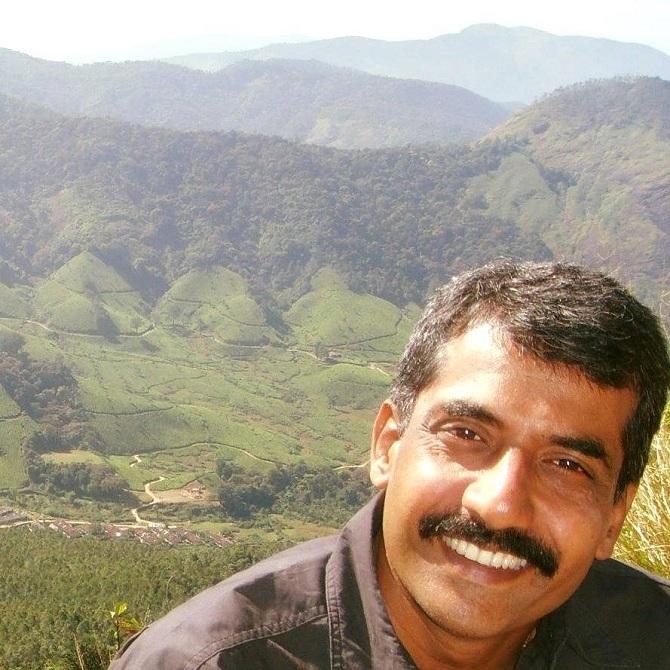A R Shivakumar: The man with the answer to India’s water crisis – rediff
Nikita Puri visits Sourabha, A R Shivakumar’s pioneering eco-friendly home where he and his family have lived without a municipal water connection for 22 years.

Over the last several years, Bengaluru-based A R Shivakumar has had hundreds of people asking him to help plan and build their homes.
Shivakumar is not an architect by training, nor is he in the business of real estate. His business card says Shivakumar is the principal scientific officer at the Karnataka State Council for Science and Technology, Indian Institute of Science.
But turn the card around and you see a cartoon of a man in the rain. Unmindful of those staring at him at a bus stop, the cartoon shows the man holding his umbrella inside out, allowing rainwater to flow in through the umbrella and into a tank strapped to the man’s back.
The cartoon encapsulates the gist of why even complete strangers ask Shivakumar if they could drop by and see his house in Vijaynagar.
All around Sourabha (Shivakumar’s house), there are trees and small water tanks with aquatic plants and fish.
The house itself is designed to “catch” rainfall on different elevations.
The family uses rainwater for all its water needs, including drinking. In the 22 years that the family has lived here, Shivakumar has never felt the need to pay a water bill.
In fact, when the house was being built, Shivakumar never applied for a water connection; he still doesn’t have one.
Shivakumar has answered questions about how he’s lived without a water connection for so long that he no longer needs prompting. He chalks out everything in detail, and you realise this was his intention all along.
“I wanted to show that we can live a self-sustained green life. This house is an example of that,” says Shivakumar.
Growing up in a village about 100 km from Bengaluru, Shivakumar’s determination to conserve water was seeded in his childhood: with his two sisters, he would wake up early in the morning to draw water from the village well.
Later on, staying in rented accommodations where water was often scarce steeled his determination not to depend on municipal supply.
In the early 1990s, even as Shivakumar and his wife, Suma, were endlessly working on blueprints for their house, he brought home a heavy bunch of files from the Indian Meteorological Department. These files contained information on the amount of rainfall in Bengaluru over the last 100 years.
“I needed to ensure that we could live off rainfall alone,” says Shivakumar.
“All our needs can be met by nature,” asserts the innovator.
And it’s not just rainwater harvesting that he swears by: skylights flood their house with natural lighting, and solar panels fashioned out of rice hull meet their other needs.
“You just walked on water,” Shivakumar tells visitors entering his house, referring to the fact that outside his house, right up till the porch, is a water storage tank of 25,000 litres.
Such tanks exist across his 2,400-sq ft property, bringing the total storage to 45,000 litres. Using pop-up filters he has a patent for, only the clean water gets stored.
As lights from the street go flashing past the windows, one realises that there are no curtains in his house.
“We don’t need them, the trees around the house give us all the privacy we need,” explains Shivakumar.
“Shivakumar has a very scientific bend of mind and he’s a very practical man,” explains John Daniel, a green entrepreneur who has known the innovator for 12 years. “He is a perfectionist and keeps thinking about how to make things better.”
In Shivakumar’s house, there’s a good reason why the grills on windows in Shivakumar’s house have no curvatures. “He’s built all of it himself, that’s why we only have straight grills,” says Suma. “This is his second home; his first home is the garage where he keeps working on things till midnight.”
Just harvesting rainwater wasn’t enough — he also wanted to re-use water from the washing machine. The initial days of this experiment were tough.
“It was very hard to live in the house back then because there was a horrible stench in the house. He wanted to use it to flush the toilets,” recalls Suma.
“Despite protests from the family, he figured out a way to reuse that water without any stench,” says Daniel.
When he isn’t at work or addressing workshops, Shivakumar is either tinkering in the garage or feeding his “pets” (the earthworms in his compost pit).
He has two more years before he retires. “Retirement just means the government is going to stop paying me, but I’m not going to stop working,” he says, laughing.
